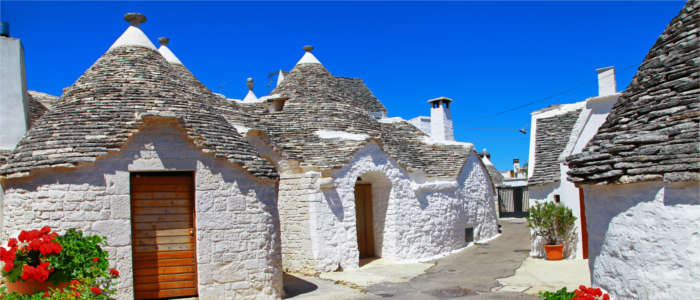Travel Offers
Travelmyne Featureprint
Distance
Apulia – A Smooth Hilly and Coastal Landscape
The flat hilly landscape and the varied coastal areas of the south Italian region of Apulia fascinate visitors with their Mediterranean and maritime atmosphere. In combination with the medieval cultural sites and the traditional white villages, the region offers the perfect combination of cultural and natural holidays at the Mediterranean Sea.

Geography - Italy's flattest region
The Italian region of Apulia lies in the south-east of the country and together with Salento Peninsula it constitutes the heel of the Mediterranean boot. Over half of the region's area consists of plains. The other half is mostly characterised by a smooth hilly landscape and a small mountainous area (a part of the Apennines). This makes Apulia the flattest Italian region. The coast along the Adriatic and Ionian Sea, which is almost 800 kilometres long, as well as Salento and Gargano Peninsula are characteristic of Apulia's geography. At Capo d'Otranto you find the most eastern point of Italy. The famous Punta Palascìa is only 80 kilometres away from the Albanian border. The Mediterranean climate in the region causes hot summers and mild winter. It only rains on 70 days per year (mostly in the winter months) and it is sunny for nine to eleven hours per day in summer.

Nature - Smooth hills and magical coastal areas
Apulia spoils visitors with great natural beauty and impressive strips of land. Besides the smooth hilly landscape and olive tree groves, the region's coastal areas are an extraordinary natural attraction. They accommodate wonderful sandy beaches (Torre dell'Orso, Porto Cesario) and a rocky shore (Otranto, Santa Maria di Leuca). Gargano Peninsula and the national park of the same name impress with their diverse mix of sandy beaches, steep coasts and idyllic bays. The offshore Tremiti Islands, the lagoon lake Lago die Varano (Italy's sixth largest lake) and the Foresta Umbra ("dark forest") with its thick beech forests are also part of the impressive Gargano National Park and popular destinations among lovers of nature. Other natural sights in Apulia are the Alta Murgia National Park with the dolina in Altamura, the nature reserve Torre Guaceto and the Caves of Castellana, one of the most beautiful limestone caves in the whole of Europe.

Culture - Historical sites and round houses with pointed hats
Apulia's numerous sights and historical buildings bear witness to the region's ancient and medieval past, for example the Cathedral of Otranto or the octagonal castle Castel del Monte. The latter was built in the times of Friedrich II and is a landmark of the region next to the cultural and art towns Brindisi, Andria, Barletta and Trani. The Baroque town Lecce is a must for every culture enthusiast because it accommodates the unique buildings of the regional period of art of the Baroque in Lecce, which awarded the town with the name "Florence of Rococo". Other unique cultural attractions are the Capuchin monastery Santa Maria delle Grazie and the region's white round houses, for example in Alberobello, the home town of the so-called trulli. These houses, which are built from stone and mortar and have conical roofs, are part of the World Cultural Heritage of the UNESCO and bear witness to the rural culture of bygone times.

Experience - Durum wheat, olive oil and music festivities
Although the Apulian cuisine appears rather simple and plain, it caters for all tastes. The basis of many dishes are durum wheat flour, local vegetables (tomatoes, courgettes, broccoli, peppers, potatoes, spinach, eggplants, Brussels sprouts, fennel, legumes etc.) and olive oil. It is apparent from the ancient olive groves all over the region that Apulia is Italy's greatest producer of the green gold. Due to its position at the seaside, not only lamb, mutton and rabbit meat are part of the menu but also fish and seafood, so that seafood lovers are spoilt for choice. Music enthusiast will feel the same way. The region hosts several music festivals and events like the Notte della Taranta, the Notte di San Giovanni or the Festival della Valle d'Itria in summer and early autumn. In addition, traditional celebrations which provide insights into Apulia's old traditions (for example the Festa di San Nicola in Bari or the International Folk Festival in Palagianello) take place throughout the year.

Activities - Bathing holidays at Italy's heel
Holidaymakers in Apulia can choose from a number of leisure activities. They can go bathing and do water sports at the seaside and the wonderful beaches. Wind or kite surfers, divers, sailors and swimmers will not be disappointed in Apulia either. Gargano's east coast is a popular starting point for surfers and the Tremiti Islands as well as the peninsula's south coast are a favoured meeting point for divers because of their many grottoes. Hikers, cyclists and golfers can pursue their hobbies in the heartland. Both Gargano and Alta Murgia National Park are equipped with signposted bike trails, on which travellers can explore the region and enjoy its untouched nature.

Information
The peak tourist season in Apulia lasts from July to the beginning of September. While the summer months offer the best conditions for going bathing, spring and autumn are the best time for hikes and sightseeing tours because these seasons are warm but not too hot and nature presents itself in all its colours. It is pleasantly mild at Apulia's coast in winter, which is why this is the best time for escaping the cold weather back home and exploring Apulia's worthwhile towns and special landscape. You should note, however, that many of the region's hotels and restaurants are closed in winter.
Apulia is perfectly suited for lovers of both culture and nature. Beach holidaymakers get their money's worth too on a trip to this region. As this southern part of Italy has been spared from mass tourism, it is characterised by tranquillity and nativeness.













































